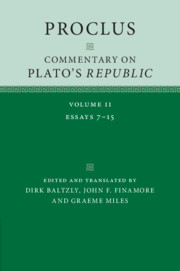Book contents
- Proclus
- Proclus
- Copyright page
- Dedication
- Contents
- Acknowledgements
- Note on the Text and Translation
- General Introduction
- On the Republic of Plato: Essays 7–15
- Introduction to Essay 7
- Essay 7 Proclus the Successor on the demonstrations in the fourth book of the Republic on the three parts of the human soul and the virtues that are 5 in them.
- Introduction to Essays 8 and 9
- Essay 8 236 Concerning the arguments in the fifth book of the Republic showing the virtues and education of men and women to be the same.
- Essay 9 251 An examination of the arguments of Theodore of Asine that render virtue the same for men and women and concerning what 5 Socrates said.
- Introduction to Essay 10
- Essay 10 258 On the discussion in the Fifth Book of the Republic demonstrating what kind the love of 5 learning of philosophers is, and what kind that of the majority.
- Introduction to Essay 11
- Essay 11 269On the Discussion in the Republic Demonstrating What the Good Is
- Introduction to Essay 12
- Essay 12 287On the Cave in the Seventh Book of Republic
- Introduction to Essay 13
- Essay 13 1 By Proclus the Lycian, Diadochus of the Platonic School
- Introduction to Essays 14 and 15
- Essay 14 81 On the Three Arguments Showing that the Just Life is Happier than the Unjust
- Essay 15 84The major sections of the Tenth Book
- References
- English–Greek Glossary
- Greek Word Index
- General Index
Essay 9 - 251 An examination of the arguments of Theodore of Asine that render virtue the same for men and women and concerning what 5 Socrates said.
from On the Republic of Plato: Essays 7–15
Published online by Cambridge University Press: 23 June 2022
- Proclus
- Proclus
- Copyright page
- Dedication
- Contents
- Acknowledgements
- Note on the Text and Translation
- General Introduction
- On the Republic of Plato: Essays 7–15
- Introduction to Essay 7
- Essay 7 Proclus the Successor on the demonstrations in the fourth book of the Republic on the three parts of the human soul and the virtues that are 5 in them.
- Introduction to Essays 8 and 9
- Essay 8 236 Concerning the arguments in the fifth book of the Republic showing the virtues and education of men and women to be the same.
- Essay 9 251 An examination of the arguments of Theodore of Asine that render virtue the same for men and women and concerning what 5 Socrates said.
- Introduction to Essay 10
- Essay 10 258 On the discussion in the Fifth Book of the Republic demonstrating what kind the love of 5 learning of philosophers is, and what kind that of the majority.
- Introduction to Essay 11
- Essay 11 269On the Discussion in the Republic Demonstrating What the Good Is
- Introduction to Essay 12
- Essay 12 287On the Cave in the Seventh Book of Republic
- Introduction to Essay 13
- Essay 13 1 By Proclus the Lycian, Diadochus of the Platonic School
- Introduction to Essays 14 and 15
- Essay 14 81 On the Three Arguments Showing that the Just Life is Happier than the Unjust
- Essay 15 84The major sections of the Tenth Book
- References
- English–Greek Glossary
- Greek Word Index
- General Index
Summary
Socrates dealt with two arguments through which he supposes that the sameness of education and virtue for men and women is rendered unstable.98 One argument leads the doctrine to something contrary to received opinion (adoxos)99 (for, attempts to go from things that are contrary to received opinions have a capacity to refute (anatreptikos), while those that go from received opinions are persuasive (pithanos) relative to the propositions that are under examination). The other argument proceeds from what was agreed upon – [an assumption] through which he showed what justice is and arranged the entire political order.100
- Type
- Chapter
- Information
- Proclus: Commentary on Plato's 'Republic' , pp. 104 - 115Publisher: Cambridge University PressPrint publication year: 2022

